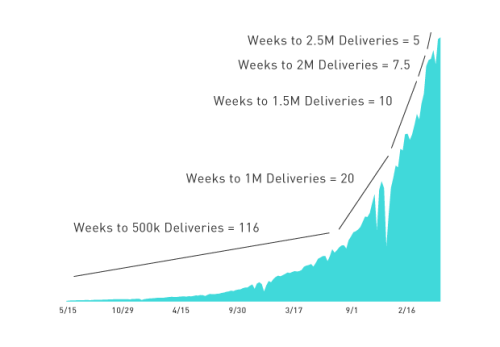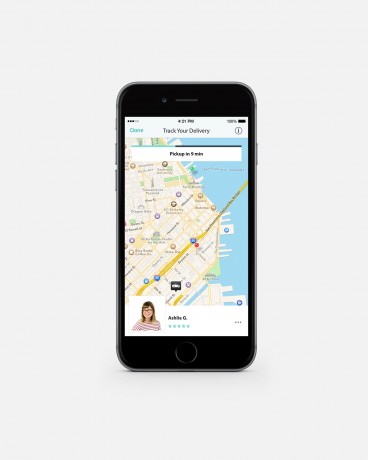
by LawInc Staff
June 28, 2015
Postmates, an on-demand logistics company that mostly delivers food and other goods locally has raised $80 million from Tiger Global Management and other investors, increasing the company’s valuation to $400 million.
The goal for the funding is to push for a new service in August that will charge customers just $1 each for deliveries at peak hours.
While this is an ambitious goal, co-founder and CEO of Postmates, Bastian Lehmann, claims that the company has surpassed 2.5 million deliveries across 28 different markets and asserts that gross profits are on track to grow more than 10x in 2015 compared to the previous year.
And while it took the San-Francisco based startup, which was founded in 2011, 116 weeks to reach 500,000 cumulative delivers in the US, it only took another 20 weeks for the company to achieve the next 500,000 deliveries.
About Postmates
The courier service began as a part of AngelPad, an American seed-stage startup incubator that provides mentorship, seed money, and networking. Investors included Spark Capital, Founders Fund, David Simmons, and David Sacks.
The company works by replying on north of 13,000 couriers who deliver goods within a city under one hour. Customers order items primarily via their cellphones using the Postmates app as well as its Global Positioning System capabilities to match inventories and consumer demand.
Postmates typically charges $5 to $20 per delivery depending on the complexity of the order and the turnaround time. While the company takes just 20% of the delivery fee, it charges customers a 9% service fee on each order and even a 15% commission for some merchants with high-frequency deliveries.
Postmates is also becoming increasingly known for its partnerships with high-profile companies. This past April, the restaurant chain Chipotle signed a deal with Postmates and the company is currently also working with Starbucks, McDonalds, and Apple to deliver products ordered the same day.
In particular, the partnership with Apple was won in a competition with ridesharing company, Uber, and the partnership is currently being test in Silicon Valley before expanding to other markets.
Moreover, Postmates recently launched the Postmates Merchant Program, which provides a $4.99 delivery fee for more than a thousand restaurants. Through the program, Postmates promises to prominently feature the restaurant in its app in return for 15% of the total order, allowing the company to reduce delivery costs to the user.
About the $1 Delivery Plan
However, the company still gets many complaints from customers regarding the high price of its delivery and service fees. Therefore, the $1 delivery plan is aimed at appeasing customers’ concerns by allowing couriers to pick up multiple items at once and deliver to nearby destinations so that couriers can quickly collect tips even if there are lower delivery fees.
Additionally, while the company currently mostly delivers food, the new plan is aimed at delivering other products including healthcare and beauty products in order to appeal to a broader set of consumers. The service will be offered in high-density zip codes during peak delivery times.
Legal Challenges
The courier service faces many of the same challenges as other startups, including ride-hailing services, Uber and Lyft. Its couriers are currently classified as independent contractors and like other on-demand start up companies, including grocery service delivery service Instacart, and food delivery service rival Try Caviar, it is being sued by some of its couriers for not being treated as employees and providing them with benefits.
Many of these suits are being brought by Shannon Liss-Riordan, a Boston attorney who specializes in labor, employment, and class action suits. She states, “These companies thought if they call themselves technology companies because they provide services by using a smartphone app, that somehow makes them different. They think they can get away with transferring the costs of doing business to their workers and depriving employees of the benefits they’re entitled to.”
She goes on to note that because these services provide a particular service, such as riders for Uber and Lyft and deliveries for Postmates, Try Caviar and Instacar, this would mean that workers who carry out those services for customers are pivotal to the business and thus should be considered employees.
If these workers prevails, the court will compel Postmates and other companies to pay for costs such as overtime, minimum wage, worker’s compensation, unemployment insurance, break time and to reimburse for job-related expenses such as gasoline and auto insurance.
The California Labor Commissioner’s ruling last week that a driver for Uber should be classified as an employee for the company will have strong implications on Postmates as well.
Lehmann has stated that if the court requires him to reclassify the couriers as employees, he will do so. However, he thinks the courriers do enjoy the system as it is where they can choose their own hours and work for multiple services.
While Postmates currently has over 13,000 couriers, the full-time staff is currently estimated to grow to around 300 employees.












